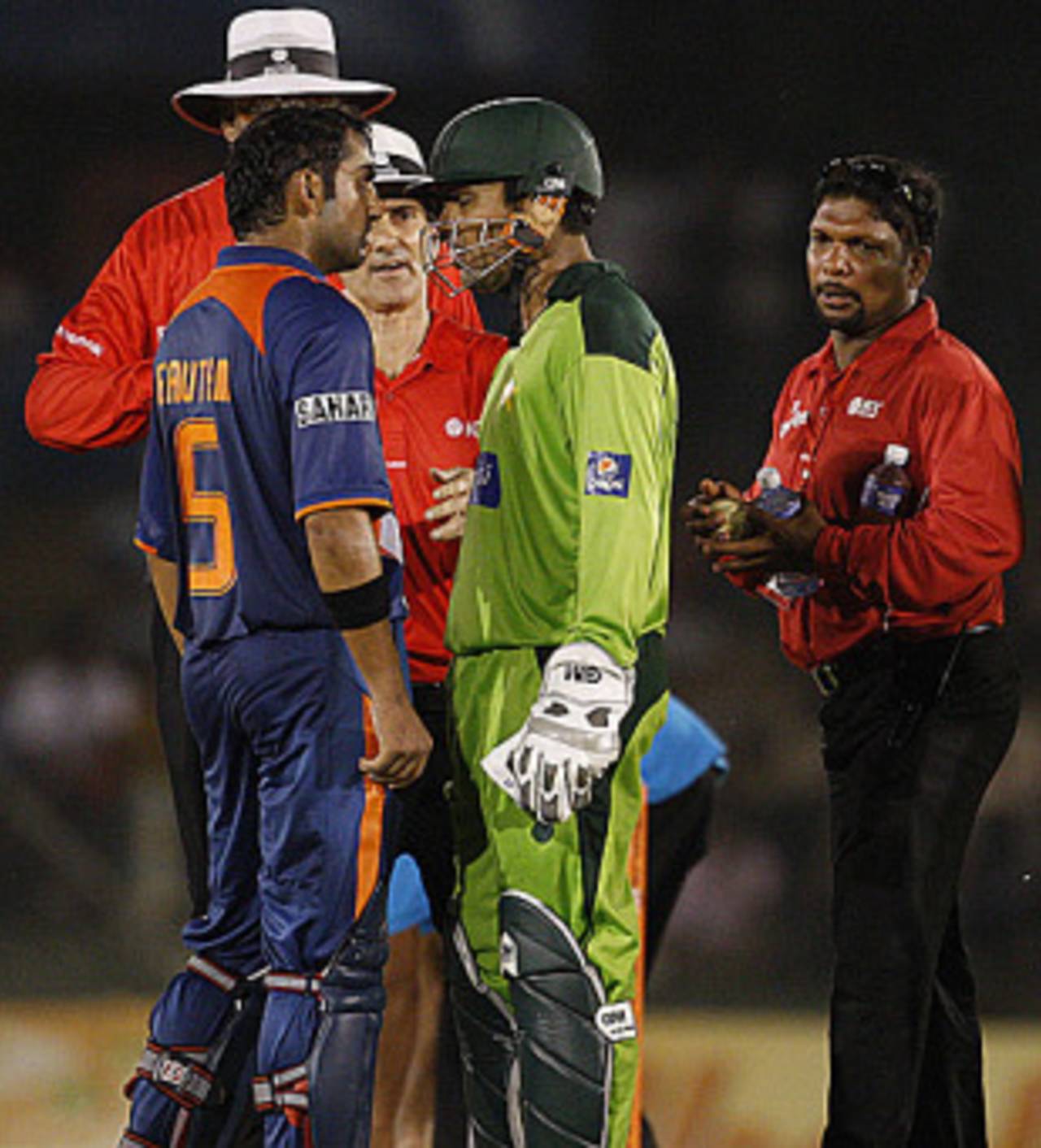India v Pakistan: a fantasy
Will the two sides meet in this World Cup? One can but live in hope
Imran Yusuf
Mar 24, 2011, 3:05 AM

Free and frank exchanges of views on female relatives has always been an essential part of the India-Pakistan rivalry • Associated Press
The Pakistani and the Indian met at college in the US 20 years ago. They formed an instant bromance. They huddled together to stave off the cold winds of the East Coast. They mated their mothers' recipes and cooked over-liquidy dal. They swapped notes on how to pull women. These notes were spare, so more commonly they swapped dirty magazines. They drank beer like amateurs and took turns holding each other over the pot when they puked. They were brothers beyond borders - and remained that way through the following two decades.
Except when it came to the cricket.
When other men talk there is always a dark, primal subtext: Who does better with the ladies? Who's got more money? Who would win in a fight? Who's read Proust? When the Pakistani and the Indian talked, the unspoken subtext was always the next match. The last match. All the matches from the past and into the eternal future.
To their compatriots and their wives, they would mouth off at will.
The Pakistani would say Shoaib had Sachin's number and the number was first ball. The Indian would say Sachin had Shoaib's number and the number was six six six. The Indian would say Pakistan had never beaten them in a World Cup. The Pakistani would say Pakistan has the better of India in Test and ODI wins. Both would imply in Hindi or Urdu that the other side had incestuous relations with their sisters.
Their compatriots would nod like automatons. Their wives would subtly change the channel to one showing Desperate Housewives.
When together, the only time the Pakistani and the Indian talked cricket was to rubbish the Ashes. "Number one cricket rivalry? These jokers haven't even fought one war against each other. We've had three! Or is it four?"
But they could not hide from their dreams. In midnight reveries they would reveal deep-seated longings. The Pakistani would fantasise about unpartitioned India-Pakistan teams. Miandad and Gavaskar totting up the runs. Imran and Kapil firing them in from each end. Sehwag opening the batting and Waqar the bowling. And Ashish Nehra and Kamran Akmal - well, they would have never even existed. In one lucid daydream the Pakistani had a crisis of conscience, realising he hadn't picked a single Bangladeshi. He hastily slotted in Shakib Al Hasan for the all-star 2000-2010 ODI team.
The Indian would wake before dawn with tears streaming down his cheeks. He had recalled Wasim Akram hugging team-mate Sachin Tendulkar during an exhibition match in 1996. In somnolent wonder he had thought of Mansur Ali Khan Pataudi and Hanif Mohammad, playing together for the Rest of the World in England, sending home messages of peace and deep regret when war broke out in 1965. He also mused on the rumours that Pakistani women were hotter than Indian women.
But in the light of day-night games, their blood would swell again with partisanship. When they lost, they would despair at a repulsive nationalism that was egged on by advertisers and political opportunists. When they won, they would dance to its tunes. And drink lots of beer.
They had not met for 10 years, having kept in touch over email and ambiguous Facebook pokes. In this time the Pakistani had watched in horror as the Indians finally developed a killer instinct. The Indian had marvelled with bitterness at Pakistan's resilient brilliance despite all that had afflicted their cricket. Both had, inevitably, got divorced.
Yet here they were, at a conference back in their college city, now ensconced in safe middle management, yet more passionate about cricket than ever before. The day of the semi-final, they bunked work and met in the Pakistani's hotel room to watch the match on live streaming.
The Pakistani ordered a steak sandwich from room service. As the Indian munched on his Spanish omelette, he deliberated again if red meat was the reason Pakistan bred such a regular supply of enviable fast bowlers. The Indian mentioned that he had read the papers for that day's conference in advance, and the Pakistani stifled a scowl, thinking of the more organised state of Indian domestic cricket.
And here they were. Pakistan had beaten West Indies and India had overcome Australia. The winner would play the final in Mumbai. The biggest semi-final ever was about to start. Their tedious lives, their beautiful children, their millions of compatriots starving, their countries' poverty indexes, the water of Kashmir, the scars of history, none of it mattered, neither of them cared, for whoever won this match would be the winner, would be better, would have meaning in their lives.
Zaheer Khan ran in to bowl the first ball.
Thud.
Silence - but for the clamour of a Punjabi crowd, and Ravi Shastri and Ramiz Raja spewing banalities.
They had both collapsed. On top of each other. Arm in arm.
When room service found them half an hour later, it was found that they had both died of heart attacks. Little did Juan, the bellboy, know that the two men were in good company. Fifty-six years ago the great writer Saadat Hasan Manto, a man in love with Bombay, who had taken up residence in Lahore after Partition, died while listening to radio commentary of the Bahawalpur Test between India and Pakistan.
And so it went. And so it goes.
Imran Yusuf is a writer who takes guard on middle and off